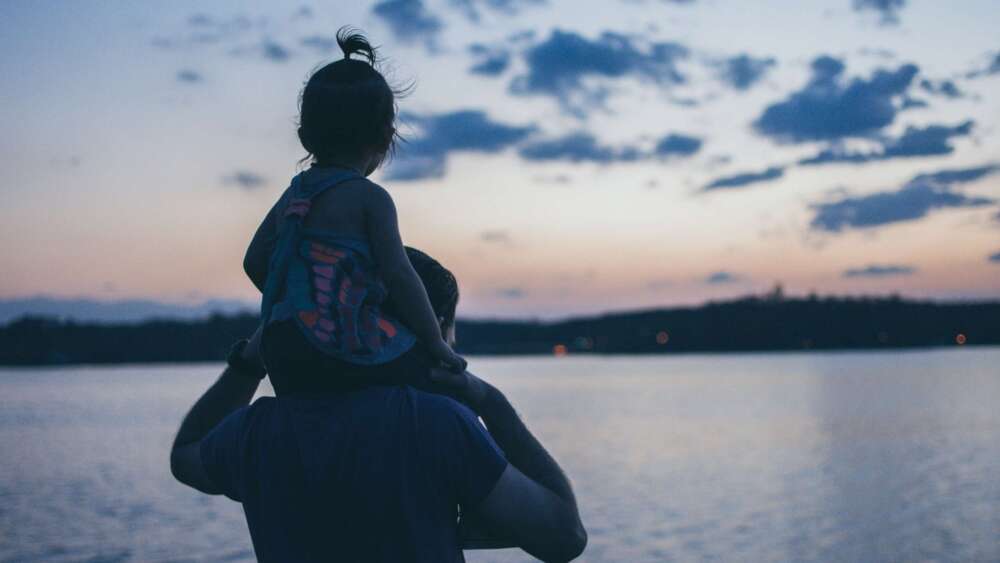When their three-year-old daughter was killed in a car fire, Barbara and Paul Ireland were thrown into a stormy sea of questions and accusations against God.
The traumatic accident that killed Laura Grace on October 14, 2003, catapulted the South Australian farming family into the public spotlight, as the crushing weight of their grief threatened to sink them.
In that first year, consumed by grief over the loss of her bubbly little daughter, Barb “let loose on God,” as she describes in her moving memoir, Daddy Will Carry Me.
“Waves of grief were constant and wild. At first, I was submerged and overcome. Sometimes, there were brief moments of reprieve in which I could glimpse a snippet of normalcy,” she writes.
“It was like standing on the ocean’s shore, splashing in its peaceful shallows. Then, while in this feeling of being composed and at peace, another grief wave would break, overwhelming me and throwing me back into depths of despair. In the early days after losing Laura, the cycle was relentless. With time, its intensity lessened, but wild breakers would still come from nowhere, blindsiding me. Almost two decades later, they occasionally still come!
“I had no filter and felt free to let loose on God with my questions and accusation. I lived in the rawness of my pain. I am eternally grateful to those who stood by me during this time. And I am forever thankful to Father God, who loved me at my worst and never let me go.”
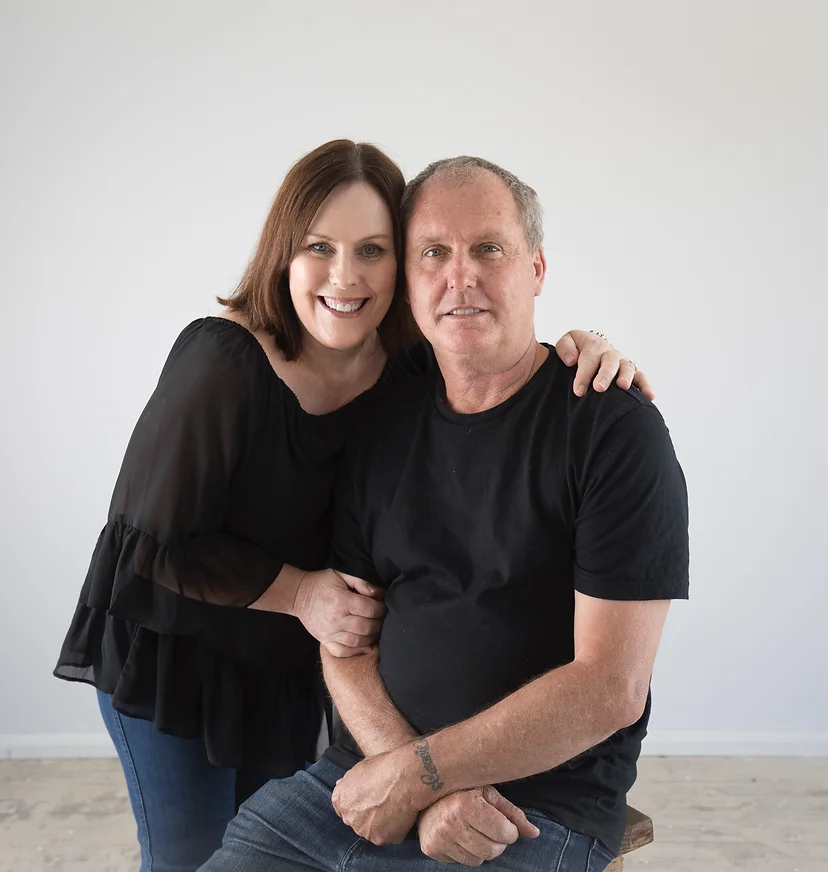
Barb and Paul Ireland
Barb tells Eternity that she was moved to write the book to encourage others who have faced a traumatic loss. Though they will be forever changed, there is hope for a good life, even when they can’t see it.
“I’d always, through the years since the accident, felt like I should write for our family, for our [other] children, Jordan and Jemma, so that one day, through adult eyes, they could read about the experience. But I’d always thought, ‘Should it be for more than that?’ When we lost Laura in 2003, we had dial-up internet. We were out on the farm. We had no bookshops I could go to. I would sit up late at night looking for stories online of Christian parents who had endured the loss of a child and survived it with their marriage and with their faith intact,” she explains.
Finding hope
“I just needed to gain hope from somebody else’s story. And in the years since, I always wondered, ‘Is our journey going to be something that can give hope to somebody else?’ But I had been procrastinating because I wanted God’s ‘yes’ on that. In the year of the first lockdown, we were driving home from church after recording our service ready for online church. A fellow pastor called unexpectedly and told me she had had a dream about me with a big pen. She said, ‘God woke me this morning and said, if you don’t do anything else for me today, ring Barb and tell her it’s time to start the book.’ That was quite a nudge for a procrastinator. So, I embarked on my writing journey.”
In her beautifully written and heartrending book, Barb describes how she fell into the trap of self-pity and bitterness as she wrestled with the big question of why an all-powerful and all-knowing God would allow Laura to die.
The trauma I had experienced was the gateway to fear. Fear had become a giant to conquer. It was shouting at me. ‘God has failed you.’
It was a question that was voiced with anger and derision and haunted the family during a three-month visit to Barb’s sister and family in China, where Paul and Barb were able to “do the work of grief” and receive godly counselling and prayer.
She writes: “[My friend] helped me to see that unforgiveness was at the heart of bitterness and self-pity. The trauma I had experienced was the gateway to fear. Fear had become a giant to conquer. It was shouting at me. ‘God has failed you. Why pray? He cannot be trusted. Life is dangerous. Nobody you love is safe. There is no help for you out there on Tragedy’s waters. You are all alone.’ Thoughts like these consumed my mind like an army occupying an invaded land. I believed the lies. I was being held captive by the enemy I had invited in.”
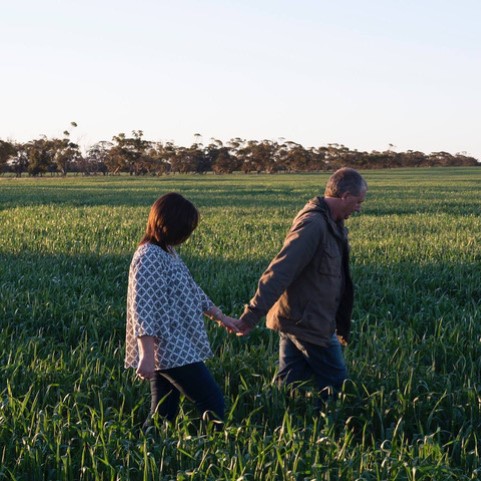
Barb and Paul Ireland
In China and on their return to the farm, Barb continued to have “full and frank” discussions with God as she wrestled with questions such as “Will we get through this? Will we live normal lives again? Will we always be this sad? Can we endure this pain?”
Choosing good, choosing life
She discovered the only way to stop holding on to self-pity and bitterness was to “choose life.” It was a daily battle and deliberate decision which eventually enabled her to stop doubting God’s character and regain trust in his goodness.
“It’s choosing to look for the good or choosing gratitude or choosing to go to his word, even when your feelings are conflicted with that choice,” Barb tells Eternity.
“Choosing to sit with people who will draw you closer to him. It comes down to that choice – ‘choose life’. As you look at that, rather than the horror of the accident and the why question, it’s like turning your thoughts towards life-giving things, and as you do, then God takes you into his heart, and you feel and hear him.”
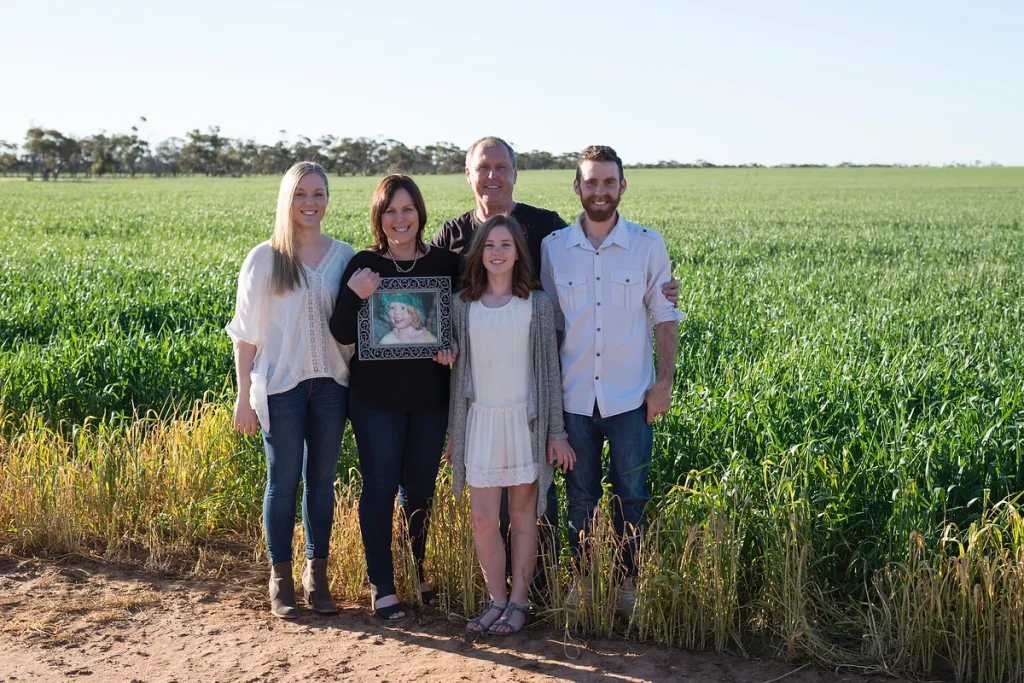
From left, Jenna, Barb, Paul, Tahli and Jordan Ireland with a photo of Laura.
Paul explains: “In those early months, the picture I often talk about is a brick wall in front of us. I could not see how we could go forward as a family from where we were. I told Barb, ‘We can choose to beat our heads against that brick wall and try and find a way, or just wait.’ And God provided cracks of light into that dark place.
“We both discovered that the world is still a beautiful place. Into that picture of black and white that was so grey and dark, shafts of colour returned. It was a process because we were incredibly hurt. God, in his kindness, continued to reveal his goodness. These were small steps; it certainly wasn’t an overnight thing. It was not an epiphany at any point – it was a process.”
When Barb, Paul and their two elder children Jordan and Jemma went to China, Barb was 16 weeks pregnant. Following the accident, the couple had sought God’s counsel about whether to try for another baby – knowing the joy it would bring but fearful of what could go wrong – and had decided to give it six months, knowing it had taken them two years to conceive Laura.
““When I was pregnant within six weeks of telling God we’re going to give it six months, it was like, ‘OK, we have the stamp of heaven on this life.’ With our travel plans in place, I didn’t have the scans and tests early on, and there was a sense of abandonment to the fear around that,” Barb explains.
After Tahli Joy was born in October 2004, healthy and perfect, Barb and Paul were overwhelmed by the goodness of God. And yet there were parallel worlds of grief and delight to negotiate.
“When Tahli was born, that was a real point of me fighting fear and letting her do what a little child needs to do. That meant more growth for me. People would say ‘One child can’t replace another.’ And we knew that full well because it wasn’t Laura, it was our new little girl. Having Tahli in the house – in a practical sense, helped me step back into life. We had the joy of having her in our family; she was an absolute blessing and continues to be. She is now 18, completed Year 12, working and going to uni next year.”
In her book, Barb paints a vivid picture of the strength of her marriage and how she and Paul managed to maintain that marital bond.
“We were deliberate in making sure that we gave each other space to grieve in our own way,” says Paul.
“We could support each other when we needed to and back each other up in those moments of weakness, but there were also those times when it was almost ‘every man for himself’ when we were consumed with our own grief as individuals.”
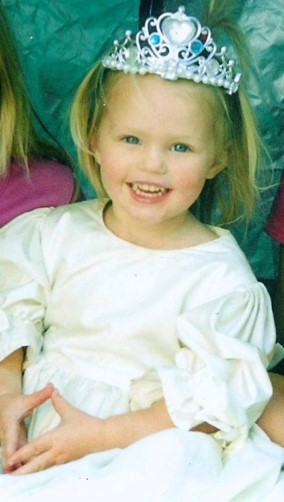
Laura Grace Ireland
One thing they feel they didn’t do particularly well was to support their older kids in their grieving process.
“The support of the wider community was really important for us because we had two older children who were grieving too in their own way. Kids’ grief is no less significant, but it’s very difficult because they don’t always have the words to express it. When we couldn’t support the children or be there for them, people from our community and family came along, sat with them, and made space for them to do their grieving in whatever capacity was needed at that moment.”
Asked what advice they could offer other people suffering from a traumatic loss, they encourage people to seek professional help and pastoral care.
“People talk about the work of grief, it’s got to be done in your own time, but there is work to be done,” says Paul.
“When you’re alone with your thoughts, that’s not a healthy place to be when you’re grieving. You need to be able to speak those out to someone who can feed that back to you in a productive and valuable way.”
There’s no answer good enough
For Barb, God answered her “why?” question through two people. Early on, she received a flower arrangement from someone she had never met, with a card that said, “Don’t go looking for answers you’ll never find.” Then a friend of her sister whose baby died at eight days old said, “There’s no answer good enough.”
“When this lady said that to me, I thought, ‘Yes, no answer would be good enough.’ And it’s almost like you don’t want God to answer that question because what answer ever could be good enough?” she says.
“I came to find peace and trust God in that. This also came hand in hand with finding hope. Our hearts were slowly turned from focusing on the tragedy and the grief that consumed us to looking forward to hope, and it’s not that you’re not sad anymore – you are – but things are placed into a different perspective as you look forward with hope.”
She advises people recovering from tragedy to have patience and wait for hope to break through the wall of grief.
“Ask God those questions. ‘Where are you?’ Ask him the why questions. Don’t be afraid to tell God how you’re feeling. We had some fairly full-on discussions going on. And in those days, I remember saying, ‘You had better bring something good out of this because her life wasn’t for nothing.’ And it was not. Don’t condemn yourself for having raw emotions. God knows our frame. He knows we are weak, so don’t fear going there. In our weakness, we truly see his strength. Also, seek wise counsel from those who are there for you, the people you are safe with, that you can trust and will make that journey with you.”
“He’s had the sin of the world on him. He’s felt the most incredible torture that we could ever imagine. He is not only strong; he truly knows our pain.”
As well as relying on people who were “the hands and feet of Jesus”, Barb also experienced a sense of Jesus holding her when she had no strength of her own.
“My friend drew a picture of Jesus in the middle holding Laura’s hand and mine. It’s Jesus who bonds us. That’s where our hope is in seeing her again – through him,” she reflects.
“We experienced the incredible power of Jesus carrying us through the pain, despite all our fears, with our family and marriage intact. We know that grief is nowhere he hasn’t already been. He’s had the sin of the world on him. He’s felt the most incredible torture that we could ever imagine. He is not only strong; he truly knows our pain.”
Twenty years later, Paul works as a pastor and school services officer with special needs children in Murray Bridge, South Australia. He is encouraged that God is close to the broken-hearted, and since Laura’s death, he can also walk with the broken.
“I’d lived a blessed life and hadn’t faced significant challenges. Before the accident, I didn’t connect with people in pain, such as those who struggle with lifetime addictions that continue to haunt them and battle things that have travelled through their family line,” he says.
“In ministering to people in their brokenness, the experience of Laura’s death now gives us a point where we can sit with the broken-hearted. Spirit talks to spirit, deep talks to deep. We can sit with people on those journeys of significant loss and not necessarily have to say anything because that connection goes beyond the mental and physical.
“My catchphrase is [Laura’s death] was the day that all the price tags changed. And I think that continues to be the case. What’s really important is pretty clear. Our relationships are gold; That’s where the joy is and the other ‘stuff of life’ is far less significant.”
Barb and Paul are available to talk at your church. You can contact them here.
